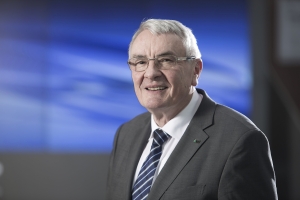Strategic thinking and acting are his strengths: As one of the main authors of the Institutional Strategy, Detlef Löhe has been involved in the merger of the former university and research center in Karlsruhe Institute of Technology (KIT) from the very beginning since 2006. Already in the 1990s when the materials scientist was dean of the Department of Mechanical Engineering did he participate in the design of future-oriented structures of newly established institutes. “I always wanted to overcome the stereotype thinking of things being of university or non-university character. We have succeeded in doing this here in Karlsruhe. I devoted ten years of my life to KIT, and these were good years!”, the Vice President of KIT for Research and Information, Professor Detlef Löhe, said during his official farewell ceremony.
Löhe has been closely connected to Karlsruhe not only since the idea was born to establish KIT. He studied and received his doctorate at the then University of Karlsruhe. After a “short trip” to the University of Paderborn, Löhe returned to Karlsruhe in 1994 as a professor of materials sciences. Now, he will retire on December 31, 2015.
“Mr. Löhe doubtlessly is one of the spiritual fathers of KIT and worked for the growing together of the two predecessor institutions with high commitment and strategic vision,” says the President of KIT, Professor Holger Hanselka. “Long before the current discussion started, Löhe noted the importance of young scientists: He creatively developed and successfully established instruments for the support of young scientists at KIT. We thank Mr. Löhe for his commitment – he did a great job for KIT.”

Vice President Detlef Löhe (left) with the President of KIT, Holger Hanselka, during his farewell ceremony. (Photo: Patrick Langer, KIT)
Young Scientists Were His Main Concern
The professional life and work of Detlef Löhe focused on the support of young scientists. At KIT, new scientific groups of young scientists were established, such as the Council for Research and Promotion of Young Scientists and the Karlsruhe House of Young Scientists (KHYS), an institution supporting the careers of doctoral students. The Young Investigator Network (YIN) is the only self-organized network of about 50 heads of young investigator groups of this type in Germany. It organizes training programs and prepares young researchers for performing executive tasks. All these institutions were supported actively and committedly by Löhe.
Löhe’s successor as Vice President for Research will be Professor Oliver Kraft, who will take office on January 01, 2016 (see KIT Press Release 081/2015).
Being “The Research University in the Helmholtz Association”, KIT creates and imparts knowledge for the society and the environment. It is the objective to make significant contributions to the global challenges in the fields of energy, mobility, and information. For this, about 10,000 employees cooperate in a broad range of disciplines in natural sciences, engineering sciences, economics, and the humanities and social sciences. KIT prepares its 22,800 students for responsible tasks in society, industry, and science by offering research-based study programs. Innovation efforts at KIT build a bridge between important scientific findings and their application for the benefit of society, economic prosperity, and the preservation of our natural basis of life. KIT is one of the German universities of excellence.

